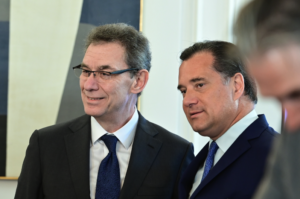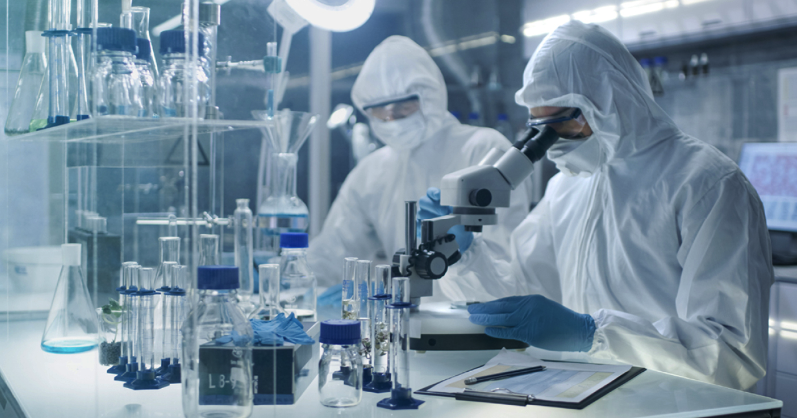“We are about to enter a period of ‘scientific renaissance’ where, thanks to advances in Biology and at the same time in technology, we will see major medical innovations in the next ten years.
” The assessment of the President of the International Federation of Pharmaceutical Manufacturers and Associations (IFPMA), head of Pfizer Albert Bourla, carries special weight in terms of the new era that is dawning and how it will change our lives.
All the more so when you consider that it was spoken just a few days ago in the heart of Greece, at the Maximou, and before dozens of representatives of the world’s largest pharmaceutical companies, as well as the Prime Minister Kyriakos Mitsotakis, members of the government and important Greek scientists, including the Chairman of the National Council for Research, Technology and Innovation, Professor Spyros Artavanis-Tsakonas and the Head of the High Level Advisory Committee for Artificial Intelligence, Professor Konstantinos Daskalakis of MIT.
Innovation and the ways in which it (should) be supported and then “offered” to citizens, enhancing their health and their lives, was the main topic of the Biopharmaceutical CEO Roundtable (BCR) held by IFPMA in Athens last week.

The Roundtable is a policy forum organised every six months by IFPMA where the heads of its member companies discuss in closed meetings.
However, high-level contacts are also held at these meetings, with the prime ministers or presidents of countries.
This was also followed in Greece. In fact, apart from the official visit to the Maximou last Wednesday, it was preceded by a dinner with PM Mitsotakis at the Acropolis Museum.
The Athens forum was held under the theme “Global health and innovation policy challenges“.

The sub-topics were future pandemics, ways to protect national health systems, the fight against antimicrobial resistance, the data brought by Artificial Intelligence, intellectual property (patents on medicines), the relevant regulatory framework and the review of European pharmaceutical policy.
Fertile ground
The elite of the global pharmaceutical industry held its latest institutional meeting in Greece, putting the country on the new global map it is designing with research, innovation and investment hubs. “One of the reasons we come to Greece is that it consistently supports innovation.
At the European level, it is one of the countries that we think takes very clear positions on important aspects of promoting innovation, such as intellectual property and access to medicines.
We want to send a message with our visit here, to this country, how pleased we are and how much we would like to cooperate with you”, explained the Greek IFPMA President A. Bourla, regarding the choice of Athens to host the BCR, last Wednesday, addressing Mr Mitsotakis.
As the head of Pfizer, Mr. Bourla has his own experience in actively supporting innovation. Pfizer’s global investment in Thessaloniki with the creation of the Digital Innovation Centre is the best example of the investments that our country can attract.
Investing in Real World Evidence (RWD) data through the integration of innovative information systems and new digital tools is high on the government’s agenda.
Besides, Greece has a relatively broad mechanism through HICC and the initiatives of the Ministries of Digital Governance and Health to collect RWD.

It has been established how crucial it is for health and for the economy to create an integrated set of data on patients, diseases, procedures, products and services. The issue was discussed at the Maximou Palace, with the head of the US-based MSD defending the added value of such a centre and the potential it creates for the country.
Biotechnology is seen as another important health sector.
And the need for innovation and research in a challenging environment, with the needs of populations increasing and health care spending shrinking, could not have been discussed at length at the formal meeting of IFPMA members with the Prime Minister and members of the government.
“Greece, having successfully tackled the pandemic and regained its international standing, has laid the foundations to become a fast-growing investment destination in the healthcare sector.
Biotechnology, pharmaceutical manufacturing, digital health, clinical trials and biopharmaceutical services are the five sectors with the greatest growth potential.
We are creating the conditions for Greece to play a leading role in these sectors”, says to “THEMA” the candidate for the European Parliament with New Democracy, advisor to the Prime Minister on health issues, former Deputy Minister of Health Vassilis Kontozamanis, who has made a catalytic contribution to the formation of an attractive business and development landscape on the one hand, and to the consolidation of communication channels and trusting relationships with the institutional representatives of the global pharmaceutical industry on the other.
The protection of intellectual property, which is a major concern for the global pharmaceutical industry in terms of investment and research on European soil, was discussed at length between Mr Bourla and Mr Mitsotakis.
The impending change in EU pharmaceutical legislation with a new regulation provides for patent protection for 6 years instead of the current 8 years, with the pharmaceutical industry translating this into a reduction in incentives for research and development of new innovative drugs.
“Twenty years ago, the difference in investment between the US and Europe was about $2 billion, so it was broadly at the same level.
In 2023 it will probably exceed $50 billion in favour of the US. This is a missed opportunity for Europe,” he said, noting that “the European Commission is coming up with a number of proposals to which we are clearly opposed.”
6172573
“We are losing our competitiveness in Europe, we are failing to attract cutting-edge investment, we are lagging behind in leading innovation indicators, certainly compared to the US, and this is something that needs to be corrected,” Mitsotakis agreed, assuring that “it will be at the top of our priorities for the next European election cycle.”
The major issue for the pharmaceutical industry of high mandatory clawbacks could not be left out of the meeting, with the prime minister describing it as “the elephant in the room” but admitting that it is a problem that needs to be addressed and is a priority for the government.
PM Mitsotakis addresses the delegates at the 15th Congress of New Democracy (video-photos)
For his part, Health Minister Adonis Georgiades proposed the investment clawback that has boosted pharmaceutical companies and the example of German multinational Boehrigner Ingelheim, which recently opened a production facility in Attica.
Who attended
The CEOs who visited Greece were twenty in total. In addition to IFPMA President Mr. Bourla of Pfizer, 19 heads of leading pharmaceutical companies were part of the delegation.
They were the following: Hubertus von Baumbach of Boehringer Ingelheim, Christopher Berner of Bristol Myers Squibb, Elcin Barker Ergun of Menarini, Robert Davis of MSD, Joaquin Duato of Johnson & Johnson, Charl van Zyl of Lundbeck, Richard Francis of TEVA, Lars Fruergaard Jørgensen of Novo Nordisk, Carlos Gallardo of Almirall, Peter Genter of Merck Group, Herve Hoppenot of Incyte, Paul Hudson of Sanofi, Daniel O’Day of Gilead, Stefan Oelrich of Bayer, Osamu Okuda of Chugai, Dave Ricks of Eli Lilly, Ueno Hiroaki of Mitsubishi Tanabe, Christopher A. Viehbacher of Biogen, Christophe Weber of Takeda.
While from the Association of Pharmaceutical Companies of Greece (SFEE), the meetings with the Prime Minister were attended by the President Olympios Papadimitriou and the Director General Michalis Chimonas.
On the government side, eight ministers, the head of the Prime Minister’s economic office Alexis Patelis, the special secretary of Long-Term Planning Yannis Mastrogeorgiou, Mr. Mr. Artavanis-Tsakonas, Mr. Aristides-Thomas Doxiadis, Vice President of ESETEK, Mr. Aristides-Thomas Doxiadis, member of the working group “A Roadmap for Creating an Innovation – Based Biopharma Industry in Greece” Mr. Simos Simeonidis and Mr. Kontozamanis, Advisor to the Prime Minister on Health Issues.






































